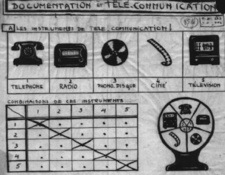urbansheep@gmail.com › Теги: гипертекст
RT @ftrain: Xanadu: I love it. Its true to his vision in "Literary Machines." The person got the thing out of his brain and onto the screen. 51 years! — http://www.xanadu.com/
#гипертекст - × × ×
ох, они _почти_ переписали его на яваскрипте. the vaporest vaporware in the world - кот от котов
THE GREATGRANDFATHER OF ALL YER VAPORWARE! Так точнее. Никакому Дюку Нюкему не снилось. ) - × × ×
The Secret History of Hypertext - Alex Wright - The Atlantic - http://www.theatlantic.com/technol...
“Historians of technology often cite Bush’s essay as the conceptual forerunner of the Web. And hypertext pioneers like Douglas Engelbart, Ted Nelson, and Tim Berners-Lee have all acknowledged their debt to Bush’s vision. But for all his lasting influence, Bush was not the first person to imagine something like the Web. ¶ Chief among them was Paul Otlet, a Belgian bibliographer and entrepreneur who, in 1934, laid out a plan for a global network of “electric telescopes” that would allow anyone in the world to access to a vast library of books, articles, photographs, audio recordings, and films.” • #удивительные_факты ∙ #гипертекст - × × ×
Погодите, но ведь главный premise гипертекста это кросс-ссылочность. - социальный груффало
Ну, кросс-ссылочность может быть внутри твоего одного терминала, а может быть внутри сети таких терминалов. У Буша мемекс был самостоятельной машиной, насколько я помню. - × × ×
25 years of HyperCard—the missing link to the Web | Ars Technica - http://arstechnica.com/apple...
"Sometime around 1988, my landlady and I cut a deal. She would purchase a Macintosh computer, I would buy an external hard drive, and we would leave the system in the living room to share. She used the device most, since I did my computing on an IBM 286 and just wanted to keep up with Apple developments. But after we set up the Mac, I sat down with it one evening and noticed a program on the applications menu. "HyperCard?" I wondered. "What's that?" I opened the app and read the instructions. HyperCard allowed you to create "stacks" of cards, which were visual pages on a Macintosh screen. You could insert "fields" into these cards that showed text, tables, or even images. You could install "buttons" that linked individual cards within the stack to each other and that played various sounds as the user clicked them, mostly notably a "boing" clip that to this day I can't get out of my mind. You could also turn your own pictures into buttons." • #карты_и_колоды ∙ #гипертекст - × × ×
Мы изучали HyperCard и HyperTalk в школе, даже делали навороченные интерактивные презентации. После него Power Point казался каким-то убогим недоразумением. - Spaceinvaderz!
ChoiceScript - Choice of Games - http://www.choiceofgames.com/make-yo...
“ChoiceScript is a simple programming language for writing multiple-choice games (MCGs) like Choice of the Dragon. Writing games with ChoiceScript is easy and fun, even for authors with no programming experience.” #гипертекст - × × ×
Card Sharks and Holy Scrollers - http://www.markbernstein.org/Oct10...
“Reichenstein’s belief that the people at Hypertext '87 were “neckbeards” is offensive. His account seems to rely entirely on the young Jakob Nielsen’s trip report; is Nielsen, that courtly Dane, a neckbeard? Doug Engelbart? Frank Halasz? Janet Walker? Randy Trigg? On this, Reichenstein has no idea what he’s talking about, he’s just making stuff up.
Reichenstein thinks the scrollers won because “99% of all websites scroll.” That’s dandy (if true — has anyone measured?), but it’s not the question at hand. What people were debating was whether following a link should take you to a new page — a “card” — or whether it should extend the text of the page you’re looking at right now.” #гипертекст - × × ×
Grammar of Hypertext - http://www.markbernstein.org/Feb10...
On Hypertext Narrative - http://www.slideshare.net/eastgat...
Understanding the difference between plot and story, and how this impacts the design of interlinked narrative. #гипертекст - × × ×



